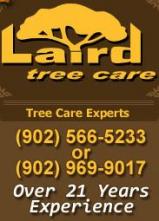Laird Tree Care

Laird Tree Carewas established in 2005. Owner, Kurt Laird, has worked in the green industry for over 15 years. He is an ISA Certified Arborist, and has been for over 12 years.
Laird Tree Careprovides the highest standards of quality service combined with reasonable and comparable rates. Laird Tree Care is fully insured and covered by WCB.
Laird Tree Careis P.E.I.'s leader in Plant Health Care browse our website and see why.
LTC's mission is to provide quality residential and commercial tree care through education, honesty, and professionalism. LTC believes in client satisfaction without compromising professional integrity..





